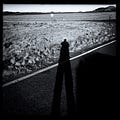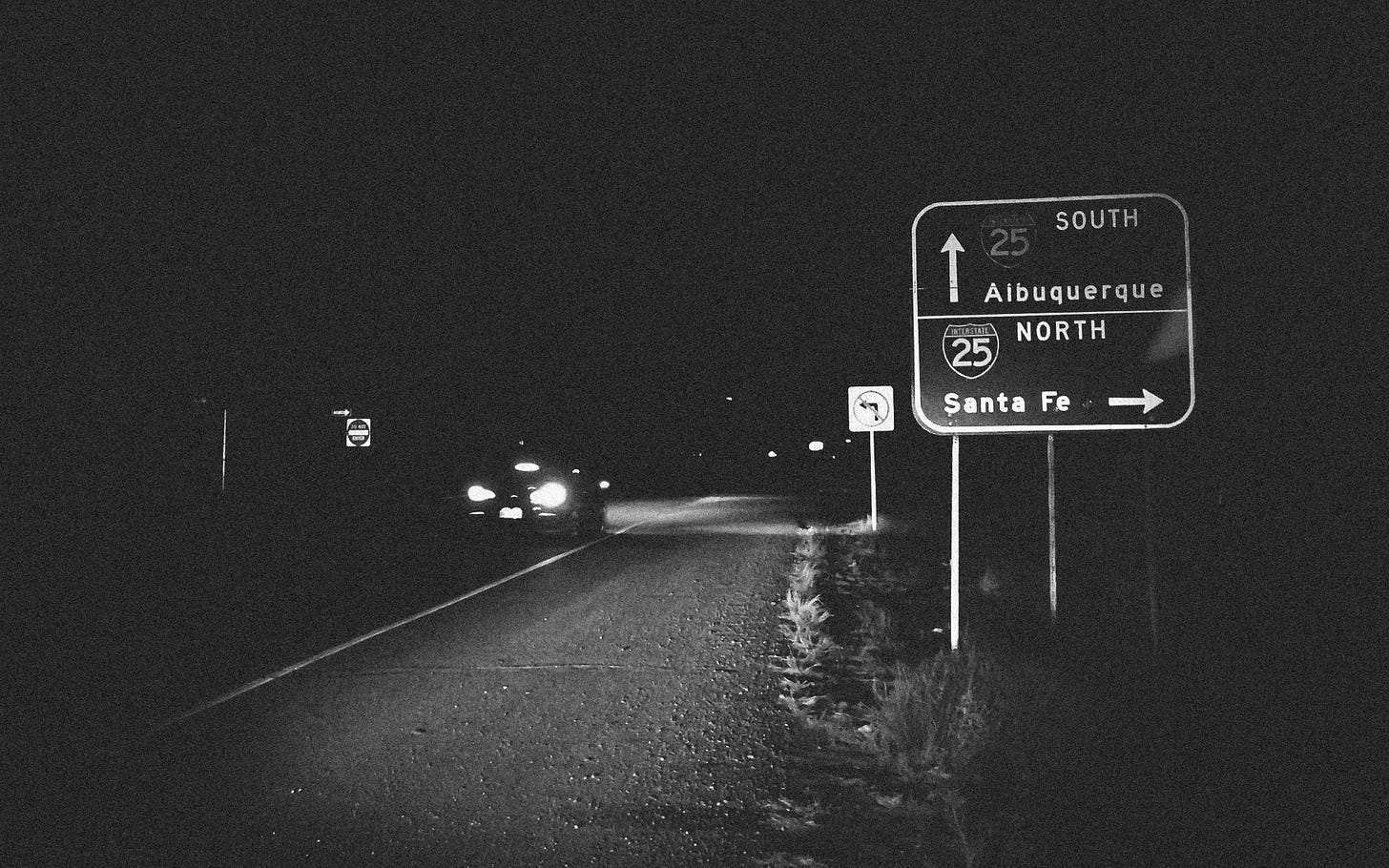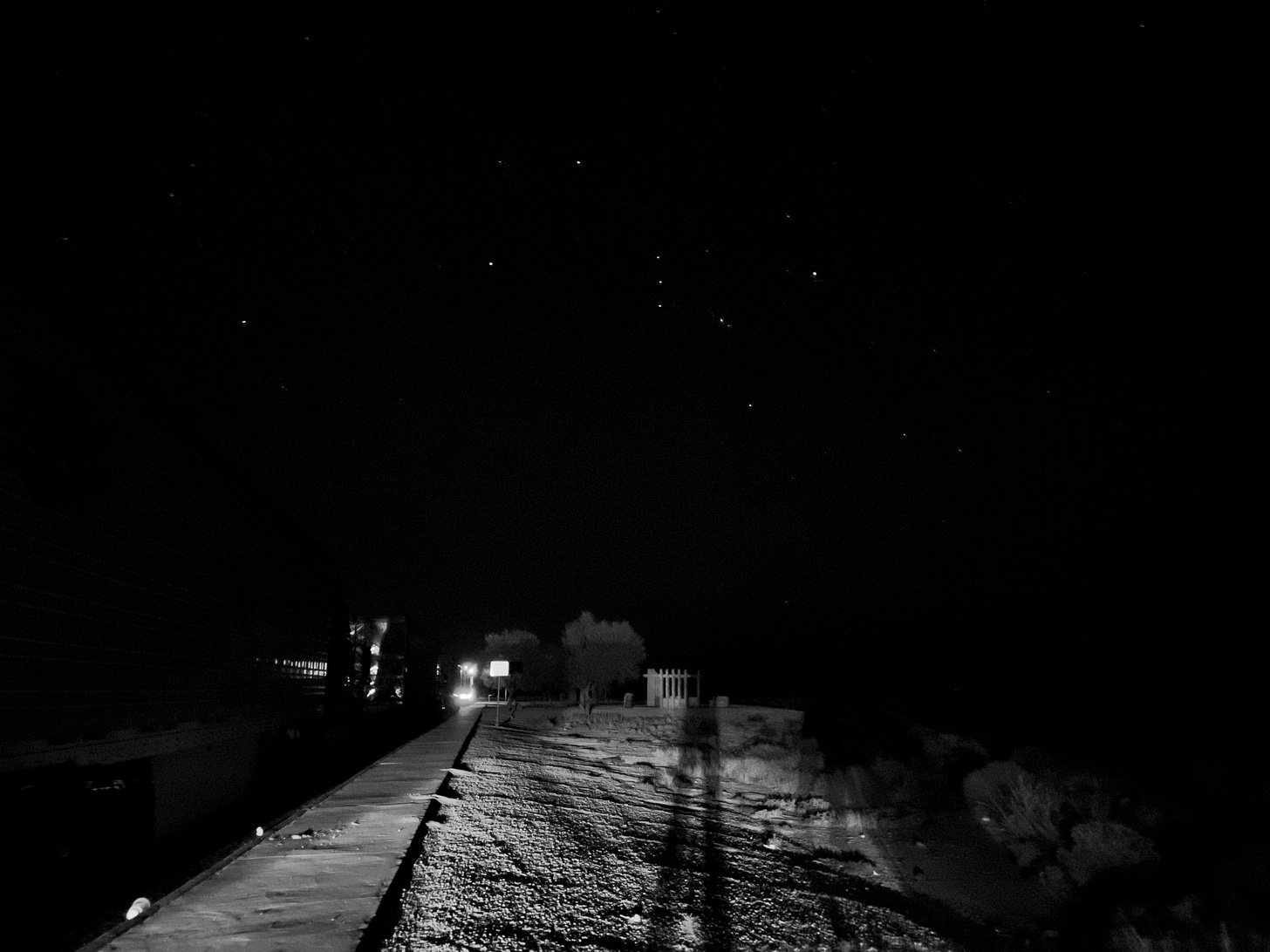The idea for this story came to me as I was trying to cope with the prognosis of cancer. It was 2014, and I was so overwhelmed with grief and sadness that the only way to cope was by driving away from New York and spending a year on the road in the American Southwest.
During those long drives, especially along the desert roads at night under the most dazzling stars, I found myself replaying scenes and memories from a life that no longer existed and having long conversations with the memories of people who were no longer alive or a part of my life; it was as if they were all ghosts who had taken up residence in my mind and had come along for the ride.
Knowing how each of these ghosts would think, I could hear them talking to me. Sometimes, I would stop along the side of the road to take notes, and everything they said would boil down to one nagging question: “Where did it go wrong?”
After the first few weeks of being on the road and replaying scenes and memories from a life that was now gone—scenes and memories filled with our struggles, our heartbreaks, and our desperations that had become deeply ingrained in us as trauma—and after reflecting on our relationships with our parents and witnessing how they coped with the same, we all came to the conclusion that our lives and outcomes could have been different if we had not been trapped in a cycle that existed long before we were born. I came to realize that everything we did in our relationships, both loving and fighting with each other, was predetermined.
The cycle had been set in motion by the patterns and behaviors of our parents and their parents before them. We could not help but make the choices we all made because, unbeknownst to us, being frontline witnesses to our parents' trauma had made most of our available options invisible. Because of that, we could only see the options that fit a view of the world shaped by our parents’ struggles and heartbreaks.
Although we must accept responsibility for our own lives and the consequences of our choices, my long drives under the vast night skies of the American Southwest gave me insight into the idea that we were doomed to struggle with life and love due to the inheritance of our parents’ and grandparents’ pain. I began to realize how deeply ingrained this cycle was in our lives, leading us to self-sabotage in our relationships. It made me question the nature of happiness itself. What is it like to live a life free of conflict and suffering? It is a life that suddenly becomes so terrifying in its boredom that we seek out situations and people that can return us to that familiar world, one that “can be explained even with bad reasons,” as Albert Camus wrote in The Myth of Sisyphus.
When we make that return, we quickly cling back to our illusions and the comfort of familiarity so that, in this absurd universe, we no longer feel like strangers to ourselves. We’re back to the suffering we’re used to, where everything can be explained—where it would be natural to see sadness as the opposite of joy and pain as the opposite of pleasure.
Coming back to this familiar duality, we eventually forget that freedom can be terrifyingly boring. What is the worth of living a peaceful and stable life if it lacks the spark of conflict and pain that could trigger the dopamine rush of fiery passion, leading to the most intense pleasures? For those who have been given an inheritance, it would not be a life worth living. It is an insane realization to come to when most of us have told ourselves at one point that we want nothing more than to be at peace and have a stable life filled with calm and silence with the ones we love.
What is even more insane is realizing that we were lying to ourselves when we convinced ourselves that this is what we wanted. Broken people, which most of us are, do not want that. Due to the trauma resulting from the decisions we had to make with our limited choices, we do not know how to exist without chaos, so we keep chasing the dragon of that dopamine rush. We seek to connect with people with whom we feel that spark.
Now that I understand the pattern and the damage that I, along with the ghosts in my memories, have caused to ourselves, I cannot unsee it. The question now becomes, “What do I do next?” I tried to write a love story from the notes I took on the road to help me figure that out. The first half of the story would show the dynamics of this grand inheritance at play and the disastrous consequences it would have. The second half of the story would show what could have been for us if we had the same gift of insight, of understanding these patterns, that I had been given during my long drives along the desert roads at night.
But by then, it was 2015, and I knew that to write a compelling story, and not an autobiography, I needed emotional distance from my own experiences. I didn’t want to base my characters on real people—the ghosts in my memories—but rather on the ideas and motivations that would lead characters inspired by them to seek refuge in consensual power dynamics as a way to deal with their painful inheritance, much like we all had to do in our real lives. My hope was that, by crafting a powerful narrative and holding a mirror up to the reader, I could help others who have used similar coping strategies avoid the same mistakes we made, placing too much value on passion and not enough on peace.
To write a story that could show this in action, I first needed to use what I had learned on the road, which meant letting go of the past and establishing my own peace. And to do that, I needed to say goodbye to New York for good and focus on moving forward. I needed to put off the idea for the novel until I had that emotional distance and was in a good place mentally to reconnect and commune with these ghosts again.
I went on to create a new life filled with joy. I was no longer under the immediate threat of cancer, and I created a routine that stabilized my mind and body as best I could. I kept to it until the world changed in 2020. Like most people who had nothing else to do but shelter in place at home, I took that time to sit in silence and boredom and face my thoughts once again.
I went back to my notes and realized that what I had wanted to write back then was not just a love story but a tale about generational trauma. With this understanding, I knew how to approach and structure the story in a way to emphasize one of the themes: to break free from the vicious cycle of pain passed down through generations, one must come to the same conclusion I did on the road—that passion is overrated. The way to accomplish this was to make the cycle clear by adding dates to each chapter and section of the story. I wanted to highlight the coincidences of events occurring on specific days in the lives of the main characters, Sylvia James and Andrés de León, and show how they interpreted this—their sense of synchronicity—as a sign of a deep connection to each other.
Their love was no ordinary love, but rather a supernatural one that was written in the stars. When a leap like that can be made, even the most excruciating pains can become bearable. However, those who do not regard love as just another drug, who prioritize respect over everything, and have healthy boundaries, will recognize the suffering and codependency that this way of thinking can cause in a relationship.
These people would not see it as a sign from the universe of supernatural love. Instead, they would see it as a sign that they need to walk away, rather than perpetuating a new cycle for their children to be frontline witnesses to, potentially limiting their options and forcing them into the same painful situations as adults, and making the same choices their parents did.
Now that I have finished writing and editing the story, I realize that I have created an epic tale spanning six decades. The story has been divided into two novels: The Beautiful World of the Alive and Athena (tentatively titled). Together, they form the series that I am calling The Desert Road of Night.
I plan to use this platform to discuss the ideas, philosophies, and themes that are at play in the series. By doing so, this platform will serve as a reference point for readers.
In addition to my writing on this platform, I have several other works available now or coming soon. The Beautiful World of the Alive is available for pre-order now and set to release on May 16, 2023. Athena will be released in the second half of 2023. I’ve also created a prequel novel called Cash Money: The Rise of Spacer Woman from the notes I had put together for Sylvia James’ backstory. Finally, I’ve published a book of poetry titled Eulogy for an Old Lover and Other Poems, inspired by some of the poems I wrote during the era covered in the series.
All of these works are currently available on Amazon, and they will soon be available through other outlets and platforms.
Actionable Advice:
Practical tips for those who see themselves reflected in this personal essay.
Accept responsibility for your own life and the consequences of your choices. Although the patterns and behaviors of our parents and grandparents may have set the cycle in motion, we have the power to make our own choices and break the cycle.
Reflect on your relationships with your parents and how they coped with their trauma. By understanding the patterns that have been passed down through generations, you can gain insight into your own behavior and how to break the cycle.
Question your own motivations and coping strategies. Are you seeking out situations and people that return you to a familiar world of conflict and suffering? By recognizing these patterns, you can begin to make different choices and break the cycle.
Let go of the past to create emotional distance. Writing a compelling story or finding another creative outlet can help you process your emotions and gain perspective.
With these tips, you can be sure that you will not end up like me, standing on the shoulder of a desert road somewhere in the American Southwest, gazing at the stars high above in the vast night sky, wondering where it all went wrong.





